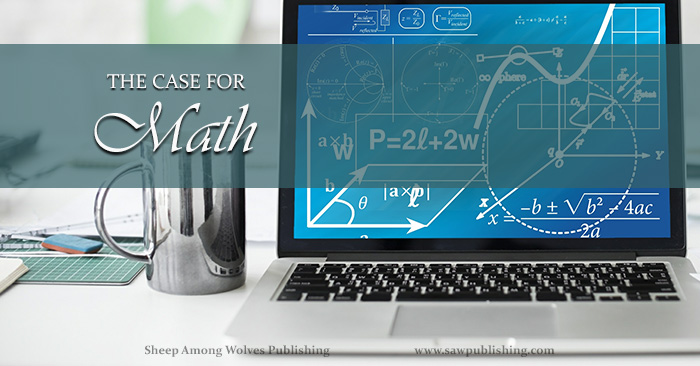The Case for Math
 Those of you who know me personally are aware just how heroic I was to write this particular post. I am not, generally speaking, the champion voice of arithmetic. It is a well-established fact that I neither enjoy nor excel at math.
Those of you who know me personally are aware just how heroic I was to write this particular post. I am not, generally speaking, the champion voice of arithmetic. It is a well-established fact that I neither enjoy nor excel at math.
To be absolutely honest, through most of my school years, I would have told you that I HATED MATH. As an adult, I am an enthusiastic proponent of the digital calculator—which on the surface looks like a math-related enthusiasm, but in point of fact is actually the reverse.
Nevertheless, and despite the personal feelings of tedium and despair which have traditional accompanied my relations to math textbooks, today we are going to take a look at the case for math—because there is a case, and it is actually a rather compelling one.
1) Math is Required for Accurate Daily Living
We in the Western world live in a highly precise society. We have a very precise concept of time. We have a very precise concept of measurements. We have very precise concepts of distance, and temperature, and age.
When we cook, we cook by (more or less) precise mathematical formulas. Our ingredients are selected by measure. Our ovens are heated to temperature. Our cooking is timed within minutes.
This same numerical precision extends across vast areas of our life and culture. Consider trying to drive without reading speed limits—or making change without using addition/subtraction—or shopping online without consulting clothing sizes, unit quantities, or delivery times.
Math is an intensely practical subject. Perhaps because of its practicality, it has become an integral part of the way we live. At least a basic familiarity with math is necessary to live life with the accuracy that is demanded by the culture in which we find ourselves.
2) Math Enables Just Dealings
Perhaps this should actually have been point number one. From a spiritual perspective, it is probably an even stronger argument. When God brought the children of Israel out of Egypt, He gave them some very specific instructions about the way they were to do business:
“Ye shall do no unrighteousness in judgment, in meteyard, in weight, or in measure. Just balances, just weights, a just ephah, and a just hin, shall ye have . . .” (Leviticus 19:35-36)
Math is a great—perhaps even an indispensable—facilitator of just dealings. It allows us to be honest in our relations to others. It allows others to be confident that we have been honest with them.
3) Math Promotes Disciplined Thinking
Discipline is a curious argument when it comes to school subjects, because unquestionably anything that you force yourself—or are forced by somebody else—to do, when your natural inclination would have led you to not do it, can be said to be valuable as discipline.
And yet our school day is short enough that we cannot really afford to spend time on a subject that has no other value than the discipline it provides.
When I say that math promotes disciplined thinking, I am referring to more than the fundamental discipline that keeps our student working at their multiplication drill even though the day is sunny, and there are birds singing outside, and they have a new baseball glove waiting in the garage.
Math is discipline in this sense. It is also discipline in a broader sense, because it trains a student in clear thinking, precises calculations, and rapid, accurate memory recall. All of these mental processes are extremely valuable and will have wide applications throughout a student’s life.
Runner Up Argument: Math Requires Repetition
Addition, subtraction, multiplication, and division take a lot of drill work. Educators at different times have sought to reduce this drill as much as possible, but there is a certain point where you can find no replacement for pure, faithful, patient drudgery.
Odd as it may sound, I think this is actually a fact that argues in favour of the case for math in our school curriculum. Students who never learn Spanish, may well pick up the language in later life. Students without any grasp of science can still absorb an amazing amount of scientific knowledge after graduating. But the percentage of individuals who have the dogged perseverance to master the first four rules of math in adult life are overwhelmingly small.
It’s hard work. It’s unexciting work. It’s work that requires a strong memory. And for that very reason, most students need to learn it because they have to learn it—while they are young enough to learn it well.
My Verdict on the Case for Math
I still do not enjoy math. I never really have. Quite possibly I never will.
However, I still find the case for math a compelling one. I find it compelling based on its practical applications—from both a temporal and a spiritual perspective.
As with all practically applied subjects, a teacher has the difficult task of judging exactly how much math will be useful to a student—and when practicality ceases and academic expectations become the only motivating factor.
But taken all together, the case for math is strong. It was strong enough to put math in our curriculum in the first place. And it is strong enough to keep it there today.
I say that, even though I don’t enjoy math!
If your student is in the same boat as I was, as a math-dreading school child, take a peak at our previous post:

Even the best math text is sometimes guilty of absorbing valuable hours without producing positive results. Are you wasting time on math? What can you do to help it?

Wordsworth’s “The Longest Day” is a poem to include in any high school curriculum. It is a masterpiece from the pen of one of the most celebrated of English writers—and it is a poem that is good as well as great.

We all recognize the fact that hands-on projects are a wonderful idea. But as kids transition from childhood to adulthood, finding motivating project ideas becomes more and more complicated.
- Character Interview with Carita from Victory’s Voice
- Good x Great: The Ultimate Excellence in Fiction


Great post, and I agree ;P
Thanks, Katja!